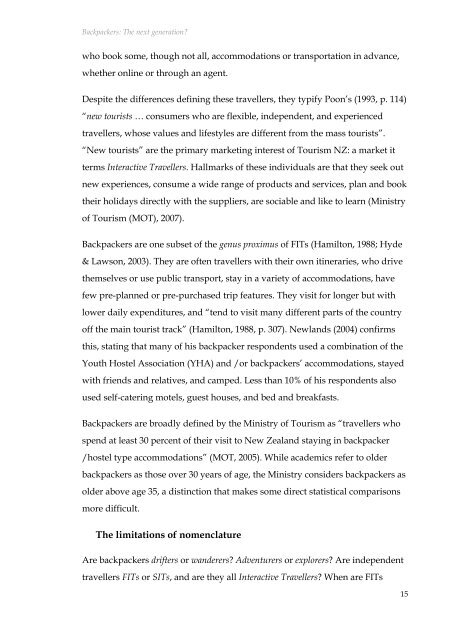Backpackers: The next generation? - Scholarly Commons Home
Backpackers: The next generation? - Scholarly Commons Home
Backpackers: The next generation? - Scholarly Commons Home
You also want an ePaper? Increase the reach of your titles
YUMPU automatically turns print PDFs into web optimized ePapers that Google loves.
<strong>Backpackers</strong>: <strong>The</strong> <strong>next</strong> <strong>generation</strong>?<br />
who book some, though not all, accommodations or transportation in advance,<br />
whether online or through an agent.<br />
Despite the differences defining these travellers, they typify Poon’s (1993, p. 114)<br />
“new tourists … consumers who are flexible, independent, and experienced<br />
travellers, whose values and lifestyles are different from the mass tourists”.<br />
“New tourists” are the primary marketing interest of Tourism NZ: a market it<br />
terms Interactive Travellers. Hallmarks of these individuals are that they seek out<br />
new experiences, consume a wide range of products and services, plan and book<br />
their holidays directly with the suppliers, are sociable and like to learn (Ministry<br />
of Tourism (MOT), 2007).<br />
<strong>Backpackers</strong> are one subset of the genus proximus of FITs (Hamilton, 1988; Hyde<br />
& Lawson, 2003). <strong>The</strong>y are often travellers with their own itineraries, who drive<br />
themselves or use public transport, stay in a variety of accommodations, have<br />
few pre-planned or pre-purchased trip features. <strong>The</strong>y visit for longer but with<br />
lower daily expenditures, and “tend to visit many different parts of the country<br />
off the main tourist track” (Hamilton, 1988, p. 307). Newlands (2004) confirms<br />
this, stating that many of his backpacker respondents used a combination of the<br />
Youth Hostel Association (YHA) and /or backpackers’ accommodations, stayed<br />
with friends and relatives, and camped. Less than 10% of his respondents also<br />
used self-catering motels, guest houses, and bed and breakfasts.<br />
<strong>Backpackers</strong> are broadly defined by the Ministry of Tourism as “travellers who<br />
spend at least 30 percent of their visit to New Zealand staying in backpacker<br />
/hostel type accommodations” (MOT, 2005). While academics refer to older<br />
backpackers as those over 30 years of age, the Ministry considers backpackers as<br />
older above age 35, a distinction that makes some direct statistical comparisons<br />
more difficult.<br />
<strong>The</strong> limitations of nomenclature<br />
Are backpackers drifters or wanderers? Adventurers or explorers? Are independent<br />
travellers FITs or SITs, and are they all Interactive Travellers? When are FITs<br />
15

















